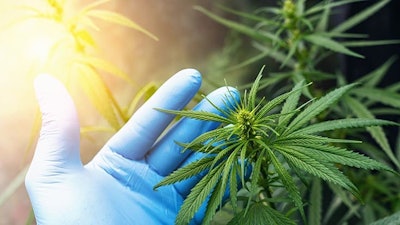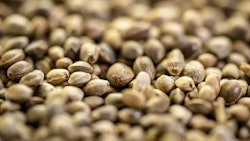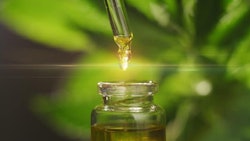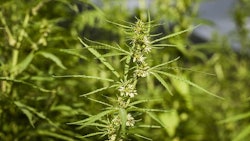
As the final rule for hemp looms in the coming year, four universities in the Midwest are partnering in an attempt to help fill the vast information gap that still exists in the industry.
The university extensions of Michigan, Illinois, Wisconsin and Purdue (Indiana) are searching for hemp farmers in their respective states who are willing to provide them with precisely taken crop samples and growing data in exchange for discounted cannabinoid testing.
The universities will publish the wealth of data they receive from farmers on the Midwestern Hemp Database, an online tool already brimming with data from the project’s nearly 200 different varieties grown by about 70 registered participants so far.
In addition to existing preliminary information on crops and growing conditions, like soil type, irrigation practice, row spacing, seed and transplant sources, varieties and more, the database will later include harvest and cannabinoid development data from the season.
The ambitious data project is based on an online database created by the University of Wisconsin last year, where farmers could enter their results for cannabidiol (CBD) and tetrahydrocannabinol (THC) testing, says Phillip Alberti, a University of Illinois Extension commercial agriculture educator who is coordinating the project.
Alberti says the goal is to collect comprehensive cultivation information throughout the Midwest to inform not only farmers on growing practices and genetics sources, but also public policy as the U.S. Department of Agriculture (USDA) works on the final rule for hemp to be issued in 2021.
“It's a very important time to really figure out what varieties are going to perform well before we have these new USDA rules for industrial hemp production, and we really just want to provide insights,” Alberti says.
Looking At Hot Hemp
Sourcing reliable genetics was a pain point for many hemp farmers in 2019, so the Midwestern Hemp Database Project will collect information on not only the varieties farmers are growing, but also where they came from.
“The interesting thing about hemp right now is that I can be selling the variety that we call Cherry Wine, and you could be selling the variety of Cherry Wine, and they might be the same genetic stock, but they may be very, very different plants,” Alberti says. “We don't really have a certification process for these varieties, and so we're seeing a lot of ups and downs with quality seed suppliers.”
Because of the variation among genetics, a primary goal of the data collection effort is to observe how cannabinoids develop in the plant over time—not just tetrahydrocannabinol (THC), but also cannabidiol (CBD), cannabigerol (CBG) and other minor cannabinoids.
Throughout the growing season, participating farmers will be required to collect their own samples with a strict protocol and tools provided by the universities. The standardization of sample collection is important, Alberti says, to assure the most accurate results possible.
The growers will need to send samples of each variety in for testing at least twice throughout the growing season. Tests will cost the growers $30 per sample, which is a discount from the normal charge of $75, a courtesy provided by the universities’ partnership with Rock River Laboratory Inc., based in Wisconsin, and Pride Analytics & Consulting, based in California.
Alberti says the goal is to update the database weekly with information throughout the growing season.
“At the end of the season, our goal is to have potentially 500, 600, if not more, data points for multiple varieties showing how they're accumulating these cannabinoids,” Alberti says. “It's very important if you want to know how much THC your variety is going to produce [and] if it's going to pass a compliance test at the end of the season. So we're using this as just a large-scale opportunity to collect as much information about cannabinoid production as we can.”
Alberti adds that he hopes to expand the project in the future.
How to Participate
Hemp farmers in Michigan, Illinois, Indiana and Wisconsin can sign up to participate by emailing Alberti at [email protected]. Both cannabinoid-producing and industrial hemp varieties are eligible. The current deadline to apply is July 31, extended from the initial July 24 deadline.
If selected to participate, growers will be expected to keep records detailing all information pertaining to the project, including row spacing, plant population, planting/transplant date, 50% flowering date, plant height at maturity, and plant yield (pounds per acre) when applicable. Growers will also need to be willing to pay a minimum of $60 for the two cannabinoid tests. (Rock River Laboratory has created a video detailing sampling protocol.)
No private or identifying information will be published on the database. For more information, visit the University of Illinois Extension's website or contact Alberti.
























